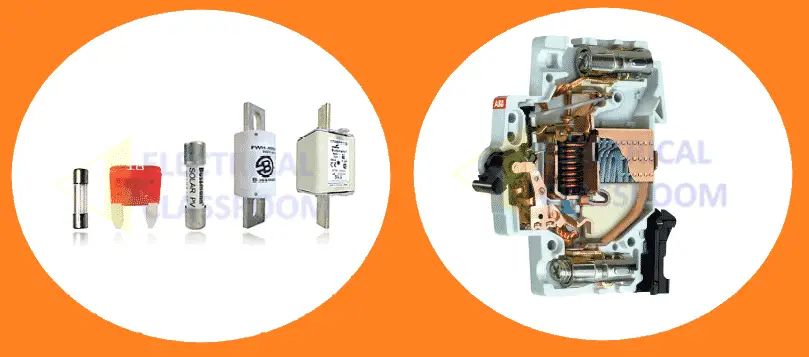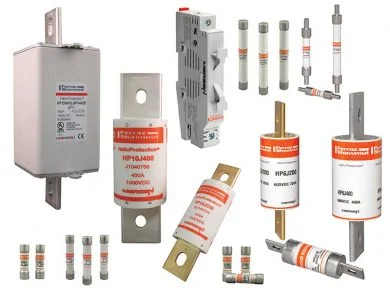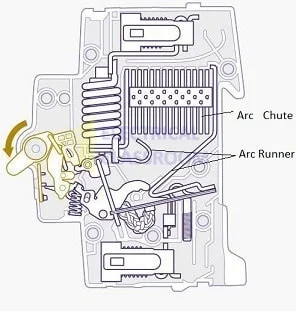Short circuits and overloads are abnormal conditions that cause heavy current flow in a circuit. Heavy currents are capable of damaging a device or a circuit and may end up with electrical hazards. Fuses and circuit breakers are protection devices that ensure the safety of the equipment or circuit in which they are used. This article is about the difference between fuses and circuit breakers and the advantages of each one of them over the other.
Clearly, neither a fuse nor a circuit breaker can prevent the occurrence of faults. Instead, they can prevent accidents and damage the equipment by interrupting the power supply to the equipment.

Electric circuits are vulnerable to various kinds of faults out of which short circuits are the highly deleterious ones. This is where circuit breakers and fuses do their job. Both do the same thing: interrupt the current flow to the circuit or equipment and safeguard the circuit from electrical hazards. But their principle of operation and capabilities are different.
Definition
Fuse
Fuse is an electrical device that during short circuits and overloads, self-destructs and stops the current flow in a circuit.
Circuit Breaker
Circuit breakers are resettable circuit protection device that, on the occurrence of faults, it senses abnormal current flow and stops the current flow in a circuit.
During short circuits, the current flow in a circuit shall be several times its normal operational current. Circuit breakers and fuses sense these currents and at once interrupts the current flow.
Principle of operation
A fuse works based on the thermal property of materials conducting carrying electric current. It consists of a metal wire or conductor material that can conduct a predefined amount of current through it. Whenever excessive current flows through the fuse, the conducting material inside it melts down and therefore the current flow through it is interrupted.


A circuit breaker is an electromechanical device that works based on the electromagnetic as well as the thermal properties of the electric current. Modern circuit breakers consist of microprocessor-based circuits to sense fault currents and interruption of current flow.
Speed of action
Fuses act faster than the circuit breakers. The operating time of the former during short circuits is 2ms while that of the later is 20ms. Trip current and trip time of microprocessor-based circuit breaker can be adjusted depending on the application.
Element used for tripping
Fuses consist of metallic wire normally made up of tin, lead, silver, copper, aluminum, etc. which melts down on the event of faults.
Circuit breaker consists of a microprocessor or relay based circuit for fault sensing and trip.
Reusability
All types of fuses except the rewireable ones cannot be reused after fault clearance. A circuit breaker can be reset and reused after they trip.
Protective functions
Both fuse and Circuit breakers can protect from overloads and short circuits. In addition to that, some circuit breakers can against earth faults, phase imbalance, phase reversal, etc.
Application
There is a wide variety of fuses available in the market at various voltage and current ratings and can be used for the protection of almost all equipment, starting from small electronic circuits to heavy-duty electric motors.
Circuit breakers can be used as an alternative to fuses. In addition, some circuit breakers can be used for earth fault protection, phase imbalance, and phase reversal protection etc.
Cost
Generally, fuses are economical than circuit breakers.
Comparison of fuses and circuit breakers
| Fuse | Circuit breaker |
|---|---|
| Whenever excessive current flows through the fuse, the conducting material inside it melts down thereby interrupting the current flow. | A circuit breaker consists of either thermal element or microprocessor circuit or sensing relay circuit for fault detection. Whenever excessive current flows through the breaker, it trips the circuit. |
| Fuses other than rewireable fuses cannot be reused. | Circuit breakers can be reused after the clearance of faults. |
| Fuses acts faster than circuit breakers. Typical tripping time 2ms. | Tripping time of circuit breaker is 20ms. |
| Can protect against short circuit and overloads. | Different types of fuses are available in the market that can protect a circuit against short circuit, overloads, earth faults, phase loss, phase reversal etc. |
| Cheaper than circuit breaker. | Circuit breakers are costlier than fuses. |
Fuse is a non-reusable circuit protection device made up of a piece of metal that melts during overloads and short circuits, whereas a circuit breaker is a reusable circuit protection device that has mechanical arrangements to sense faults and interrupt the circuit. Both of them have advantages and disadvantage depending on the circuit and situation in which they are used.
Hope this article has answered your queries on the difference between fuses and circuit breakers. If you still some doubts, let us know through the comment section below. We are always happy to clear all your doubts.
Read More: Causes behind a circuit breaker trip
Conclusion
Fuses and circuit breakers cuts the current flow to a circuit or a load whenever they sense abnormalities. Circuit breakers are gradually replacing the fuses due to their added advantages. Circuit breakers are reusable whereas fuses are not.

Hi what type and size of circuit breaker would you recommend to prevent a 30amp BS HRC fuse from blowing
Thanks
I really appreciate, i have leaned alot of things about circuit breakers and fuses.